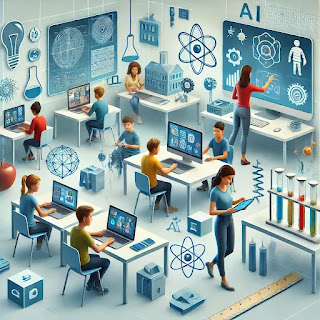AI Practice for Teacher Educators Day 57: AI in Collaborative STEM Activities
Enhancing STEM Collaboration with AI Tools
AI tools can transform STEM activities by facilitating teamwork, solving complex problems, and providing real-time feedback. Today, we’ll explore how to use AI to support collaboration in STEM education, fostering innovation and critical thinking.
Why Use AI in Collaborative STEM Activities?
-
Encourages Teamwork:
- AI tools support shared goals and responsibilities among team members.
-
Simplifies Complex Problems:
- Breaks down large problems into manageable steps with AI assistance.
-
Promotes Hands-On Learning:
- Engages students with simulations, data analysis, and interactive experiments.
-
Provides Real-Time Insights:
- Offers instant feedback and suggestions for improvement.
AI Tools for Collaborative STEM Activities
-
Tinkercad:
- Facilitates collaborative 3D design and prototyping.
-
Wolfram Alpha:
- Solves mathematical equations and generates data visualizations.
-
CoLab (Google):
- Supports collaborative coding and data analysis in Python.
-
Labster:
- Offers virtual science labs for conducting experiments.
-
Desmos:
- Provides graphing tools for collaborative exploration of mathematical concepts.
Practical Activity: Plan a Collaborative STEM Task
-
Choose a STEM Challenge:
- Select a project that requires teamwork and creative problem-solving (e.g., designing a bridge, creating a sustainable water system).
-
Introduce AI Tools:
- Example: Use Tinkercad for 3D modeling and Labster for virtual lab experiments.
-
Guide Collaboration:
- Assign roles (e.g., designer, researcher, presenter) and set milestones.
-
Present and Reflect:
- Have teams share their solutions and discuss the collaborative process.
Sample Workflow
Challenge: Designing an Energy-Efficient Building
- Tools: Tinkercad, Wolfram Alpha, and Labster
- Process:
- Use Tinkercad to create 3D models of the building design.
- Use Wolfram Alpha to calculate energy efficiency metrics.
- Use Labster to simulate renewable energy experiments.
Reflection Questions
- How did AI tools enhance collaboration in the STEM activity?
- What skills did students develop through this process?
Handy Tip: Encourage Iteration
- Use AI tools to test and refine ideas, emphasizing the value of trial and error.
Next Steps
- Resource Suggestion: Explore "AI in STEM Education" by EdTech Strategies for more tools and techniques.
- Prepare for Day 58: AI in Personalized Career Counseling. Reflect on how STEM collaboration activities can prepare students for real-world challenges.
Empower students to innovate and solve problems collaboratively with AI tools that inspire creativity and critical thinking!
